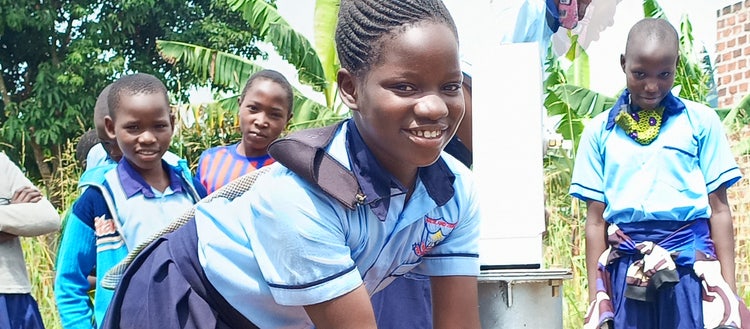WHOlives teams up with students at The University of Utah and Adobe to promote clean water around the world

The University of Utah is built on the idea of helping students harness opportunities to make their dreams come true. Founded in 1850, the University educates more than 30,000 undergraduate and graduate students every year. At the David Eccles School of Business, one of the most important ways that faculty help students reach their goals is by encouraging real-life experiences to expand their skillsets, network with leaders in business or community, and see their work make a difference in the world around them.
For the past three years, the David Eccles School of Business has teamed with nonprofit WHOlives and Adobe to raise awareness for the need for clean water worldwide. In the Social Impact Challenge, teams of two to three students are given a week to design an effective fundraising page for WHOlives using the online design tool Adobe Express.

“Students learn to work on digital storytelling skills with Adobe Express, while supporting the goals and vision of a great cause in WHOlives,” says Chong Oh, Information Systems Program Director, David Eccles School of Business at the University of Utah. “It’s a win-win situation for everyone.”
Designing a better future
WHOlives is a nonprofit organization started in 2010 with one mission: to end the world water crisis. Its flagship program is the Village Drill, a portable and manually operated drill that is still strong enough to reach underground water reserves and provide a close source of clean water to even remote communities. Access to clean water improves health and sanitation, while freeing up time for women and children who no longer need to spend their days trekking miles to collect water.

“We love collaborating with university students,” says Mike Anderson, Director of Operations at WHOlives. “Students helped us develop our drill and design our website. We appreciate the energy that students bring, but also the fresh ideas. Students aren’t constrained by anything we’ve done previously, and they’ll often explore new avenues that push us to continue evolving.”
The Social Impact Challenge 2022 started with a workshop where teams of students learned about the requirements for the project and received basic lessons on design principles. The design workshop helped students understand the thinking and psychology behind good website design, branding, and marketing. Students then spent a week building upon these principles to create a compelling website meant to attract and engage audiences.
“We want to encourage all students at University of Utah, not just those from the business school, to participate in these competitions. They can gain the real-world experience and digital literacy training that will serve them in any career,” says Oh. “Adobe Express is an excellent solution for this competition because students can easily make a professional and fantastic-looking website. It gives them confidence to work with technology and explore digital spaces in the future.”
Watering the roots of change
Social Impact Challenge 2022 saw participation from 75 students on 17 teams, including one team from the University of Utah campus in South Korea that gave its design an international bent with English, Korean, and Spanish versions. Each team took a slightly different approach to the challenge, but the Adobe app made it easy to incorporate bold visuals, embedded video, and clean graphics that augment the text and better convey the message of WHOlives.

The 2022 winning design came from graphic design student Trish Luu and information systems students Abigail Joyce Salamera and Sally Tran. While Salamera had used Adobe Express for class assignments before, she was only familiar with creating videos, not web pages.
“Adobe Express was very user-friendly, especially for those of us who’ve never built websites,” says Luu. “Abbey gave us a few pointers, but Sally and I could start working on the design right away.”
“I liked that we could establish all of the brand elements for the design — like colors and fonts — and reuse them across all elements of the design,” added Salamera. “We created a video and marketing campaign outline in addition to the website. Having established branding helped us give everything a consistent look.”
The winning design is built around the idea of “watering the roots of change”. The website introduces short stories and videos highlighting the difference that water access can make to real women and girls living in Kenya. An accompanying marketing campaign encourages audiences to interact, share, and give their support with clear calls to action.
“It was a very collaborative design process, with everyone working together to make sure that we’re communicating to keep the design moving forward,” explained Tran. “We tried to really lean into the idea of us being the WHOlives audience. What did we think was interesting about WHOlives? What made us want to learn more? We aimed to create something that people would want to click and read and share.”
Clean water for all
The University of Utah plans to continue the yearly competition to challenge students while raising awareness for clean water around the world.
“We’re so inspired by our work with students, and we can’t wait to see what ideas they bring us next year,” says Anderson. “Through this collaboration with the University of Utah and Adobe, we’re raising awareness about clean water with students, educators, and partners throughout the community. We’re impacting around 11 million people so far with our Village Drills, and with the help of our partners, we want to help millions more in the future.”